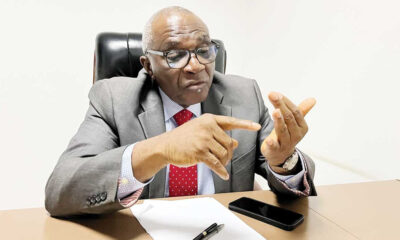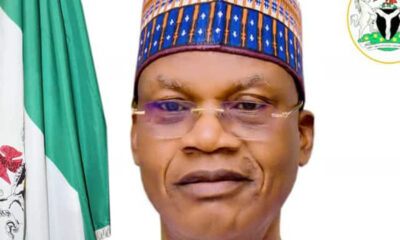News
TETFund Interventions: VCs, Rectors, Provosts lament extortion by Reps

TETFund Interventions: VCs, Rectors, Provosts lament extortion by Reps
Some vice chancellors of Nigerian universities, rectors of polytechnics and provosts of colleges of education, have cried out over alleged extortion by the House of Representatives Committee on Tertiary Education Trust Fund (TETFund) and Other Services.
They decried what they called “unwholesome overbearing influence” in internal matters of the institutions.
The latest outcry came in respect of the planned implementation of the 2024 approved normal intervention projects of TETfund in federal and state universities, polytechnics and colleges of education.
Some vice chancellors, rectors and provosts, as well as bursars and accounting officers of the institutions, who spoke to Daily Trust Saturday, alleged that extortion by the House Committee on TETFUND had been the trend over the years, as members of the committee make life difficult for them.
One of the vice chancellors said the committee had taken the alleged “intrusion” to another level.
He said, “Besides directing us to come with ‘Ghana Must Go’ bags of photocopied documents, we have been forced to pay money in order to get a clean bill. I am not sure they are even reading the documents.
“It appears they (the legislators) are abusing the powers the Nigerian constitution gives them,” he said.
When Daily Trust Saturday reached out to the chairperson of the committee, Princess Mariam Onuoha, for her reaction to the allegations, she simply sent the phone number of the spokesperson of the House of Representatives, Akin Rotimi, to respond.
When our reporter reminded her that the allegations bordered directly on her committee and that it was important for her to react to the issues, she simply replied via a text message, “When you are done with Hon Akin on the matter then you would see there is no need for further engagement on a mere invitation by a standing committee. Thank you very much.”
READ ALSO:
- DHQ establishes PTSD centres for battlefield soldiers
- Hunger Protests: Why Tinubu can’t govern like Buhari – Farooq Kperogi
- Food Items: FG to import garri, maize, others to crash prices – Minister
When our reporter called the House spokesperson, Akin and explained that he was referred by the TETFUND committee chairperson, he requested that the questions be sent to him for reaction.
The questions were sent to him on January 24, 2024 via WhatsApp, and the message marked read, but he is yet to provide the reaction despite reminders.
Many institutions under ‘scrutiny’
There are 53 federal universities, 63 state universities, 38 federal polytechnics, 49 state polytechnics and many federal and state colleges of education, among other institutions.
Many of the institutions benefit from TETFund, which mandates include providing essential physical infrastructure for teaching and learning, instructional material and equipment, support for research and publications, academic staff training and development.
Questionable oversight
Daily Trust Saturday learnt that each TETFund benefitting university, polytechnic or college of education is allegedly being asked to pay N2 million to facilitate the “verification” of the documents submitted to the House committee.
The recent allegations are coming on the heels of letters sent by the committee to the institutions across Nigeria, directing them not to proceed with the implementation of the approved projects until they meet with members of the committee.
President Bola Tinubu had approved over N683 billion as 2024 allocation to beneficiary institutions under the TETFund scheme.
This was disclosed by the executive secretary of TETFund, Sonny Echono, an architect, during the 2024 Strategic Planning Meeting held with heads of the institutions in January 2024, at the Fund’s headquarters in Abuja.
Speaking at the meeting, Echono said, “I am pleased to inform you that Mr President has approved the 2024 disbursement guidelines in the total sum of N683,429,268,402.64. From this total, 90.75 per cent is budgeted for direct disbursement and 8.94 per cent for some designated special projects. A stabilisation of 2.27 per cent is allowed to enable the Fund respond to emerging issues.
“This is inclusive of the difference between actual collections and the projections made for November and December 2023 collections as requested and approved by Mr President.
READ ALSO:
- Emefiele’s wife declared wanted over alleged fraud
- Tinubu signs electricity bill into law to address host community concerns
- Bus driver set traffic official on fire in Edo
“Based on this approval, each university will get, for the 2024 intervention cycle, the total amount of N1, 906,944,930.00. This comprises N1, 656,944,930.00 as Annual Direct Disbursement and N250m as Zonal Intervention. Similarly, each polytechnic will get N1,165,355,235.00 comprising of N1,015,355,235.00 as Annual Direct Disbursement and N150m as Zonal Intervention, while each college of education will get N1,398,426,282.00 comprising of N1,248,426,282.00 as Annual Direct Disbursement and N150 million as Zonal Intervention.”
Echono charged heads of beneficiary institutions on early implementation of their respective allocations.
He advised them to consult widely with their respective communities in the implementation of TETFund projects, and also ensure timely payments to contractors and vendors when due.
This, he said, would enable proper completion of projects and mitigate the incidence of contractors writing letters of complaints to the Fund.
However, the House committee has directed that no project should be executed until the heads of the various institutions submitted details of their implementation plans and also appear before a panel.
The committee, in a letter dated January 12, 2024 and sent to the secretary-general, Committee on Vice Chancellors of Nigerian Universities (CVCNU), Prof Yakubu Ochefu, ordered stoppage of execution of TETFund projects across the country for the 2024 intervention cycle.
The letter, with reference number NASS/HR/10/EDT/VOL4/237 and signed by the committee’s clerk, Gbolagun Isaiah Akinwunmi, requested all universities to, among other things, submit drawings, designs and specifications, procurement, among others, to the committee.
The communication directed that relevant documents be submitted to the committee, on or before February 23, and that the heads of the institutions are to appear before it on February 27, 2024.
“In accordance with the House committee’s statutory oversight mandate on all public tertiary institutions in relation to the implementation of all TETFund interventions and allocations, I am directed to request your institution’s 2024 TETFund normal intervention implementation details.
“You are requested to furnish the committee with the full implementation details, including but not limited to the drawings, designs and specifications for all projects procurement and services as contained in your 2024 TETFund Normal Intervention Allocation letter issued to your Institution.
“In view of the above, and sequel to section 80(3) of the 1999 Constitution of the Federal Republic of Nigeria (As amended) and the Standing Orders of the House of Representatives, the House Committee on TETFund and Other Services shall conduct further consideration of your submission to ensure compliance with the Fund’s Guidelines and Establishment Act as part of its oversight function. Kindly note that you are expected to stay action on implementation processes until submission and appearance before the committee is concluded,” the letter reads.
READ ALSO:
- Port Harcourt refinery set to resume operations, receives 475,600 barrels of oil
- Man dies of heartbreak after wife slept with her ex-boyfriend 2 days after wedding
- Naira crisis: How Cardoso fumbled at Senate’s meeting – US-based Professor
But the heads of the institutions lamented that the move constituted a stumbling block to early implementation of TETFund projects.
Besides, they also view the move as a usurpation of the powers of the governing councils of the various institutions and that of TETFund, who have direct oversight of the institutions.
A vice chancellor of one of the federal universities said the lawmakers were allegedly hiding under the guise of the exercise to extort universities.
He said, “I must tell you that it is not in the interest of the universities but their pockets.
“We all know what they want to do; it is to make money from the institutions, if not, why ask us to go for verification or presentation of our implementation details after the president has approved funds and TETFund carried out their disbursement according to laid down rules?”
He alleged that lawmakers and some government agencies have been extorting tertiary institutions through numerous visits in the name of oversight.
“We have different committees visiting us from different government agencies in the name of quality assurance, oversight visits, among others; and during each visit, you are expected to part with a certain amount of money. And to be honest, it makes leading the universities difficult.
“Every intervention is carried out with the approval of the president, and follows due process as well.
“The federal government has to look into this and stop these unnecessary visits. The universities are already crying to meet up with several expenses like buying diesel and paying light (electricity) bills, among others,” the VC said.
An accountant in one of the federal polytechnics described the oversight function as “a racket.”
“There was a certain review before the latest invitation. The committee asked us to photocopy all the documents and bring them in ‘Ghana Must Go’ bags.
“I was really shocked when we arrived together with our rector. They didn’t ask us to open the bags; they just asked the rector some questions.
“Of course, they have been settled far ahead of time; therefore, within the shortest time we were asked to leave,” the accountant said.
What the law says
Meanwhile, Daily Trust Saturday learnt that the TETFund guidelines on project interventions have made it clear on how allocations are to be implemented.
READ ALSO:
- Super Eagles mourn fans who died during Nigeria-South Africa match
- President Tinubu is not deaf
- Police kill notorious kidnappers terrorizing Abuja, Kaduna, 2 other states
A source said TETFund gives allocations, but the institutions in turn propose their projects, which must be in tandem with their needs.
He said the beneficiary institutions were always encouraged to have a strategic plan for at least 10 years, indicating the kind of projects the institution would like to undertake.
He said this was to avoid a situation where some institutions or politicians would hijack or stop the projects initiated by previous vice chancellors.
The source explained that TETFund projects are a continuous process and no one would stop an ongoing project or embark on another without finishing the one that has commenced.
Although TETFund declined to speak on the summons to the heads of the tertiary institutions by the Reps committee, a copy of its guidelines obtained by Daily Trust Saturday showed that there are well specified rules already stipulated, which the institutions must meet in order to access the funds to carry out projects or procurements.
Move will delay projects implementation
Meanwhile, the Committee of Pro-Chancellors of State-owned Universities (COPSUN), in a statement issued on January 24 and signed by the secretary of the committee, Suleiman Abubakar Mahdi, on behalf of the chairman, lamented the directives of the House committee.
The statement, with ref number, COPSUN/PR/24/001 and titled “Press statement on the directive to the vice chancellors of Nigerian universities suspending the implementation of TETFund normal interventions,” noted that the committee “is gravely concerned about this unprecedented directive given at a time when the universities are in various stages of procurement and the likely effect it will have on their budgetary implementation processes.
“It should be noted that the governing councils of the various state-owned universities are by law empowered to award or approve the award of contracts after due procurement and are doing so in exercise of the prerogative.
“With the greatest respect to the House committee, we feel that their action is not an encroachment on the autonomy of the universities but an infringement on the doctrine of the separation of powers, which has the potential for conflict among the tiers and branches of government.
“The House committee may wish to be respectfully reminded that the funds disbursed by TETFund belong to the states and are subject to appropriation and exclusive oversight by the various states’ House of Assembly. Therefore, the directive, even if valid, should not apply to the state-owned universities.
“Furthermore, time is of essence in executing these contracts, and with the upward trend in the dollar exchange rate with the resultant inflation, this could ultimately increase cost,” the COPSUN stated.
-agency
TETFund Interventions: VCs, Rectors, Provosts lament extortion by Reps
Daily Trust
News
Why governors’ forum is silent on Rivers emergency, by DG
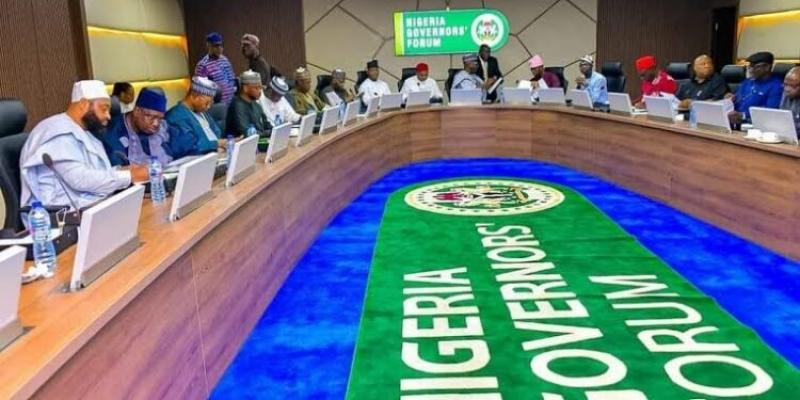
Why governors’ forum is silent on Rivers emergency, by DG
The Nigeria Governors’ Forum (NGF) yesterday attributed its neutral position on the recent declaration of a state of emergency in Rivers State to the need to steer clear of taking positions that may alienate members with varying political interests.
Taking positions on contentious partisan issues, the NGF said, would not augur well for it, especially in view of its past experience in fundamental division.
Notwithstanding, the declaration of the state of emergency by President Bola Tinubu yesterday generated more kudos and knocks from across the country.
Special Adviser to the President on Senate Matters, Senator Basheer Lado, said the action of the president was meant to ensure protection of lives and restoration of law and order in the state, while the President’s Special Adviser on Media and Public Communications, Sunday Dare, said his principal was required to “avert needless harm and destruction .”
National Publicity Secretary of the ruling All Progressives Congress (APC), Felix Morka, said Tinubu, by his action, cleared what had manifested as a constitutional crisis in Rivers state.
But former President Goodluck Jonathan saw it from a different perspective.
READ ALSO:
- Senate didn’t get 2\3 majority for Tinubu emergency rule in Rivers –Tambuwal
- FG destroys another 200 containers of expired drugs
- Rivers court bars woman from answering ex-husband’s name
He described “abuse of office and power by the three arms of government in the country“ as a dent on Nigeria’s image.
The NGF, in a statement by its Director General Abdulateef Shittu, said it is essentially “an umbrella body for sub-national governments to promote unified policy positions and collaborate with relevant stakeholders in pursuit of sustainable socio-economic growth and the well-being of the people.”
It added: “As a technical and policy hub comprising governors elected on different platforms, the body elects to steer clear of taking positions that may alienate members with varying political interests.
“In whatever language it is written, taking positions on contentious partisan issues would mean a poor sense of history — just a few years after the forum survived a fundamental division following political differences among its members.
“Regardless, the Forum is reputed for its bold positions on governance and general policy matters of profound consequences, such as wages, taxes, education and universal healthcare, among others.”
It asked for “the understanding of the public and the media, confident that appropriate platforms and crisis management mechanisms would take care of any such issues.”
Why governors’ forum is silent on Rivers emergency, by DG
News
Rivers: Tinubu acted to save state, economy, says Karimi
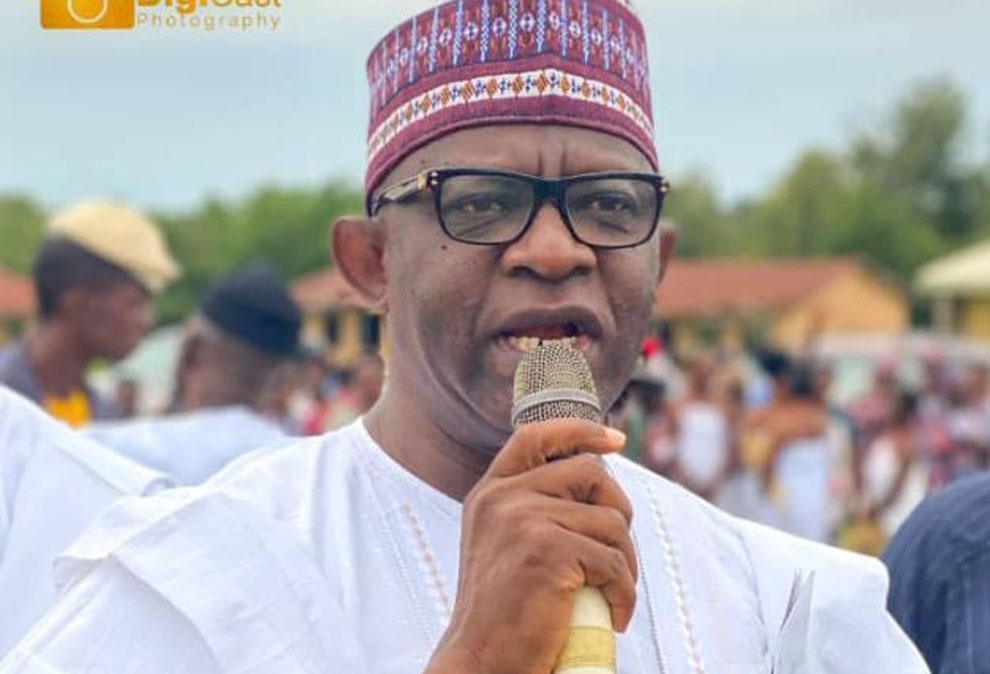
Rivers: Tinubu acted to save state, economy, says Karimi
Chairman of the Senate Services Sunday Karimi has hailed President Bola Tinubu for the decision to declare a state of emergency in Rivers State.
He told reporters on Friday in Abuja that the President acted in the best interest of the State and Nigeria, having taken his decision in compliance with the Constitution.
“No President or government worth a name, will fold its arms and watch a political situation deteriorate to what we saw unfolding in Rivers State.
“We saw that bombing of pipelines had begun, and the security situation was getting worse with the tension everywhere”, Karimi stated.
Karimi, who represents Kogi-West on the ticket of the All Progressives Congress (APC), recalled the “fatherly role” Tinubu had played in the crisis since 2023 in a bid to get the Minister of the Federal Capital Territory (FCT), Nyesom Wike, and suspended Governor Siminalayi Fubara to reach an understanding, to no avail.
He explained: “We were all here in 2023 when Mr President called that truce meeting at the Aso Rock Villa. There was the eight-point agenda for settlement reached between the factions.
“When Nigerians expected that progress should be made to achieve peace, things started deteriorating considerably to a point where the governor demolished the House of Assembly building and administered the state with only three legislators.”
READ ALSO:
- Oluwo accuses Ooni of plotting to dethrone him
- Natasha: Court blocks recall attempt, stops INEC
- US ends legal status for 500,000 immigrants
Karimi observed that with the recent judgment of the Supreme Court, which gave the upper hand to the 27 lawmakers loyal to the camp of the FCT Minister, matters merely got worse in the State as the lawmakers were set to impeach the Governor.
“What did you expect would be the implications? There would have been more destruction, killings and economic losses for the country.
“With the bombings that had already started, it was a matter of time before the whole state would be engulfed in flames. No responsible President would sit, arms folded, and allow that to happen “ he added.
The senator further argued that it took “painstaking efforts” by the administration to raise daily crude oil production to around 1,800 barrels, noting that Nigeria’s economy was already “witnessing a rebound under the renewed hope projects of the government.”
“Allowing the situation in Rivers to get worse before he would act, wouldn’t have helped the state or Nigeria as a country in any way.
“Mr. President intervened at the right time, and his actions are covered by law,” he said.
Karimi also spoke on the emergency declaration in Borno, Yobe, Adamawa and a couple of other states by former President Goodluck Jonathan without removing the Governors from office or suspending the state assemblies.
According to him, the case with those States was not generated by political crises but rather security concerns.
“So, I will advise those comparing the two scenarios to remember that one was purely about security threats resulting from the insurgency caused by Boko Haram, while that of Rivers is clearly political.
“It was the proper thing to do to suspend the political actors in the two factions to allow for tensions to diffuse. Nigerians should appreciate the President for the action he has taken so far,” he stated.
Sen. Karimi also noted that there was no cause for alarm as the National Assembly had indicated that the emergency rule could be reviewed as soon as there were signs that things could quickly normalise in Rivers State.
Rivers: Tinubu acted to save state, economy, says Karimi
News
Just in: Tinubu swears in Rivers Sole Administrator Ibas

Just in: Tinubu swears in Rivers Sole Administrator Ibok-ete Ibas
President Bola Tinubu has sworn in Vice Vice Admiral Ibok-ete Ibas (Retd.) as the Sole Administrator of Rivers State.
The administrator was sworn in on Wednesday after a short meeting with the President.
Tinubu announced the appointment of the retired naval chief at a nationwide broadcast on Tuesday, when he declared a state of emergency in Rivers State and suspended Governor Siminalayi Fubara, Deputy Governor, Ngozi Odu, and the state House of Assembly members.
The President said his decision was based on Section 305 of the 1999 Constitution, saying he could not continue to watch the political situation in Rivers escalate without taking concrete action.
The suspension of Fubara and other elected representatives has been rejected and condemned by many eminent Nigerians, legal luminaries, groups such as Atiku Abubakar, Peter Obi, Femi Falana, the Labour Party (LP), the Peoples Democratic Party (PDP) and the Nigerian Bar Association.
However, the emergency rule has been praised by the pro-Nyesom Wike Assembly led by Martins Amaewhule, accusing Fubara of contravening the Supreme Court ruling on the political situation in the state.
Ibas was the Chief of Naval Staff from 2015 to 2021.
He is from Cross River State where he had his early education.
The new sole administrator went to the Nigerian Defence Academy in 1979 from where he proceeded to have a successful career in the Navy, rising through the ranks to the very top.
He is a member of the Nigerian Institute of International Affairs (NIIA) and the Nigerian Institute of Management.
President Muhammadu Buhari who appointed him as Chief of Naval Staff conferred him with the National Honour of Commander of the Federal Republic (CFR) in 2022.
-

 metro2 days ago
metro2 days agoAttack on Mufty of Ilorin: Onikijipa Family Charges Stakeholders to Call Sheikh Habibullahi Al-Ilory to Order
-

 Health3 days ago
Health3 days agoNigerian doctor pioneers W’Africa first robotic prostate cancer surgery
-
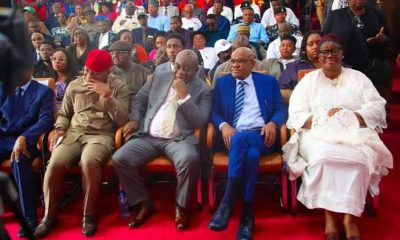
 metro3 days ago
metro3 days agoFubara: Supreme Court reacts to photo of Justice Agim with Wike
-

 metro13 hours ago
metro13 hours agoRivers administrator Ibas fires Fubara’s political appointees
-
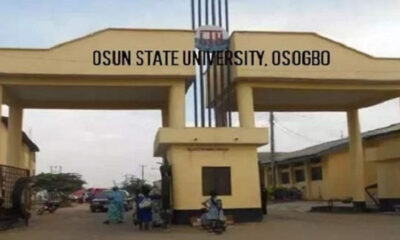
 metro3 days ago
metro3 days agoUNIOSUN mourns as 5 students die in auto crash
-

 metro12 hours ago
metro12 hours agoJUST-IN: Ex-Oyo gov Ajimobi’s first child Bisola dies At 42
-

 metro1 day ago
metro1 day agoHow ritualists, native doctor drugged, murdered underage sisters in PH – Police
-

 International2 days ago
International2 days agoCanada removes bonus ranking points for job offers in Express Entry system



